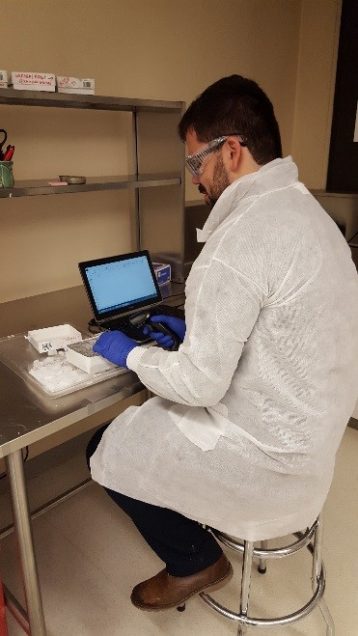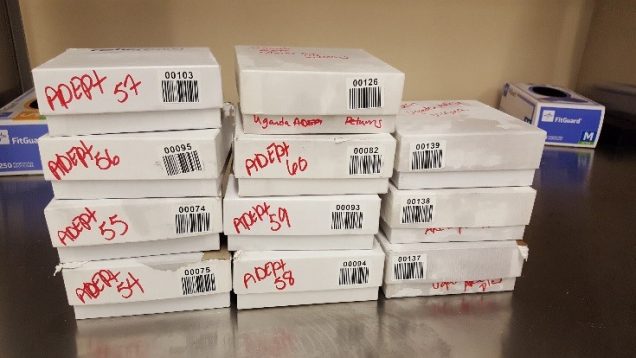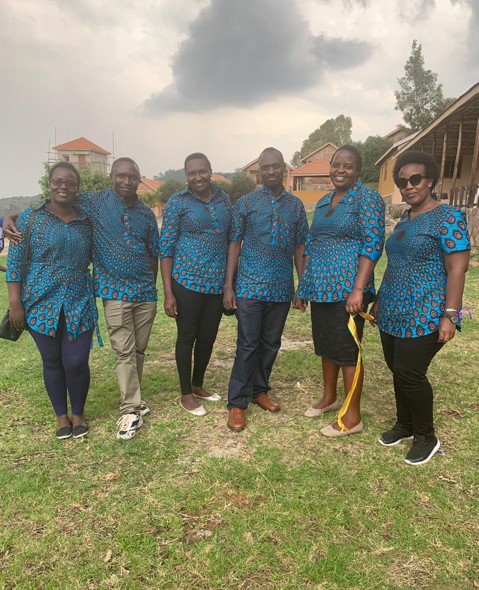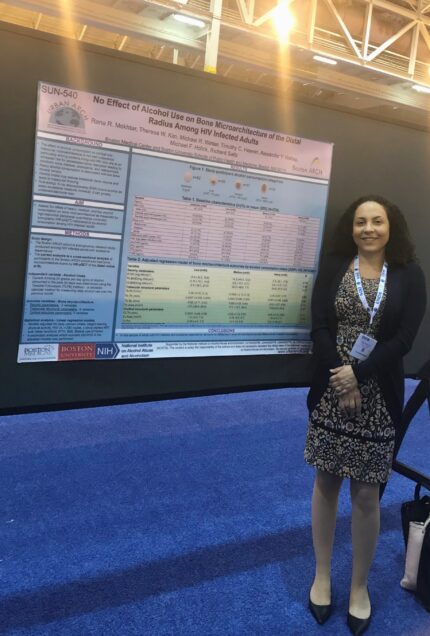Core and Cohort Updates
Admin Core

The Admin Core has been busy working on maintaining the URBAN ARCH sample repository. In January, Jules Canfield and Trevor Baker rescanned and consolidated all current ADEPT samples from the Uganda Cohort. In total, over 5,000 samples were rescanned and consolidated over the course of 3 days – from 64 cryoboxes to 53.
Additionally, a variety of samples were sent to Boston from Russia in February, including whole blood samples, serum and plasma samples, and DBS cards, as well as fecal samples from the TMAO and ACME studies. Jules and Trevor spent a couple days spot checking and inventorying these 7,500+ samples into the repository. Finally, in March, Jules and Trevor shipped a batch of DBS cards from the Uganda cohort to USDTL for PEth testing and a number of fecal samples from the Russia cohort to the University of Louisville for testing.
During the annual Conference on Retroviruses and Opportunistic Infections (CROI) in Seattle, WA from March 4-7th, Jeffrey Samet met with Kendall Bryant and URBAN ARCH investigators from other sites to discuss HIV and substance use research from the perspective of a wide array of disciplines.

Lastly, the Admin Core is preparing for the 2019 URBAN ARCH Annual Meeting that will take place on April 9-10 in Boston. Activities for April 9th include our annual Trainee Networking Breakfast & Specific Aims Critique Session and, new to this year, a presentation highlighting the latest alcohol measurement research methods. On April 10th, join us for a full day with the Boston, Russia and Uganda Cohorts where we will discuss study updates and findings as well as future directions in HIV/alcohol research. We look forward to welcoming both internal and external investigators and collaborators back to Boston! Please RSVP here, if you would like to register to attend this year’s Annual Meeting.
BDM Core

The BDM Core is working to prepare data and reports for the URBAN ARCH annual meeting and upcoming Data Safety Monitoring Board meeting. Sara Lodi’s abstract “Per-protocol analysis of the ZINC trial using causal inference methods” was accepted as a poster at the International Workshop on HIV and Hepatitis Observational Databases (IWHOD), which will take place in March in Athens, Greece.
We are also excited to welcome a new student, Mam Jarra Gai, to the core! Mam Jarra (pictured) is a graduating MPH candidate with a concentration in Epidemiology and Biostatistics at BUSPH. She’s interested in infectious disease surveillance and global health, and also currently works as a student assistant for the Black Women’s Health Study at the Slone Epidemiology Center at BU.
Uganda Cohort
The ADEPTT study continues to progress smoothly as expected. As of March 1, 2019, we have enrolled 169 participants into the study, including 56 alcohol abstainers and 113 people with current alcohol use. We have screened 890 participants, of whom 743 were eligible for further screening for latent TB. Out of 700 PPD placements completed, 173 participants had positive results for latent TB and are eligible for the study. We have completed baseline procedures for all 169 participants, 164 two-week follow up study visits, 160 month-1 visits, 151 month-2 visits, 149 month-3 visits, 137 month-4 visits, 122 month-5 visits, 127 month-6 visits, 95 month-7 visits, 72 month-12 visits, and 28 month-18 visits. Fourteen participants have discontinued TB preventive therapy (INH) due to grade 3/4 level toxicities and two women have discontinued INH due to being pregnant.

We look forward to presenting ADEPTT data at the 2019 RSA Conference in Minnesota (June 22-26). The recently accepted abstract titled “Factors Associated With Elevated Transaminases In People Living With HIV on Anti-Retroviral Therapy in Uganda Who Drink and Do Not Drink Alcohol”, will be presented as a talk in the “Symposium for HIV, alcohol, and comorbidity: from microbiome and immunity to clinical outcomes”.
Russia Cohort

As of March 1st, St PETER has enrolled 269 participants and an additional 20 participants have continued on in the Russia ARCH cohort without enrolling into St PETER. Three-month completion rate for St PETER is 78.1%.
We completed all study visits for the PETER PAIN study (UH2AA026193) in December and are in the process of completing planned study analyses.
In February, the team received the second batch of St PETER, TMAO, and ACME study samples (whole blood, PBMC, plasma, serum, stool, DBS cards) from Russia.

The team is actively pursuing data analyses, abstract submissions, and manuscript preparation.
Accepted Abstracts:
- Per-protocol analysis of the ZINC trial using causal inference methods (Sara Lodi, et al.)
- Poster presentation at International Workshop on HIV and Hepatitis Observational Databases (IWHOD), March 2019.
The Russia ARCH cohort welcomed a NIDA INVEST fellow, Dr. Marina Vetrova, to the team. Marina is from Pavlov State Medical University in St. Petersburg, Russia where she has been an assessor on the ZINC/ARCH, SCRIPT, St PETER, ACME, TMAO, and on-site project manager for the SCRIPT and PETER PAIN studies. In her NIDA INVEST fellowship she will study the role of HIV and substance use stigma on the HIV treatment cascade from different perspectives. We are excited to have Marina with us!
Boston Cohort
As of March 1st, Boston ARCH 4F has completed 157 baseline visits (142 with participants from the original Boston ARCH Bone Cohort and 15 with participants new to the cohort) and 101 6-Month follow-up phone interviews. We have also begun conducting annual follow-up visits, and have completed nine 12-Month follow-up in-person interviews.

The Boston ARCH team has continued to pursue new analyses using data from the original Boston ARCH Bone Cohort. Rana Mokhtar will be presenting a poster entitled “No effect of alcohol use on bone microarchitecture of the distal radius among HIV infected adults” at the Endocrine Society’s ENDO 2019 annual meeting in March. Two abstracts have also been accepted for oral presentation at the 81st Annual College on Problems of Drug Dependence (CPDD) Scientific Meeting in June 2019. Nicolas Bertholet will present “Polysubstance use patterns and HIV disease severity among those with substance use disorder: Latent Class Analysis” and Samantha Rawlins-Pilgrim will present “Substance use and quality of life in an urban cohort of people living with HIV and substance dependence.”
New data is also emerging from the Boston ARCH 4F Cohort. An abstract describing the 4F population thus far, “Falls in people living with HIV infection and alcohol and other drug use”, has been accepted at the 42nd Annual Research Society on Alcoholism (RSA) Scientific Meeting in June 2019 as part of a larger URBAN ARCH symposium on “HIV, alcohol and comorbidity: From the microbiome and immunity to clinical outcomes.” These data will also be presented at the Emory CFAR’s HIV and Aging: From Mitochondria to the Metropolis conference in April 2019.